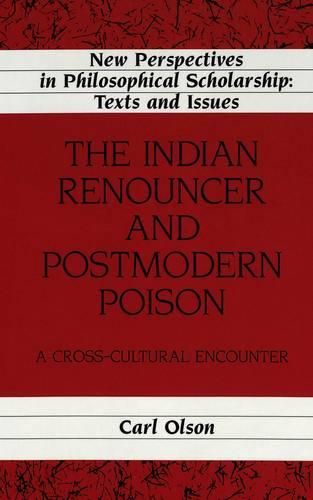Readings Newsletter
Become a Readings Member to make your shopping experience even easier.
Sign in or sign up for free!
You’re not far away from qualifying for FREE standard shipping within Australia
You’ve qualified for FREE standard shipping within Australia
The cart is loading…






In his essay on the pharmacy of Plato, Jacques Derrida discusses the ambivalence associated with the notion of pharmakon (drug, medicine, or poison) and its ability to either cure or destroy. By allowing the Indian renouncer and selected postmodern thinkers to share the medicine of each party in a cross-cultural exchange of ideas, this work will attempt to cure one’s understanding about the several roles played by the renouncer as a stranger, hero figure, androgynous being, and victim of self-sacrificial violence. The Indian Renouncer and Postmodern Poison includes a look at the possibility of the renouncer assuming the roles of a masochistic or narcissistic figure. By examining the renouncer’s way of life and the variety of roles that he can play, this work demonstrates how the renouncer transforms himself into a symbol of difference. Throughout this study, the theoretical work of selected postmodern thinkers (e.g., Derrida, Kristeva, Levinas, Deleuze, Bataille, Blanchot, and Foucault) are used to raise new questions about the Indian renouncer.
$9.00 standard shipping within Australia
FREE standard shipping within Australia for orders over $100.00
Express & International shipping calculated at checkout
Stock availability can be subject to change without notice. We recommend calling the shop or contacting our online team to check availability of low stock items. Please see our Shopping Online page for more details.
In his essay on the pharmacy of Plato, Jacques Derrida discusses the ambivalence associated with the notion of pharmakon (drug, medicine, or poison) and its ability to either cure or destroy. By allowing the Indian renouncer and selected postmodern thinkers to share the medicine of each party in a cross-cultural exchange of ideas, this work will attempt to cure one’s understanding about the several roles played by the renouncer as a stranger, hero figure, androgynous being, and victim of self-sacrificial violence. The Indian Renouncer and Postmodern Poison includes a look at the possibility of the renouncer assuming the roles of a masochistic or narcissistic figure. By examining the renouncer’s way of life and the variety of roles that he can play, this work demonstrates how the renouncer transforms himself into a symbol of difference. Throughout this study, the theoretical work of selected postmodern thinkers (e.g., Derrida, Kristeva, Levinas, Deleuze, Bataille, Blanchot, and Foucault) are used to raise new questions about the Indian renouncer.